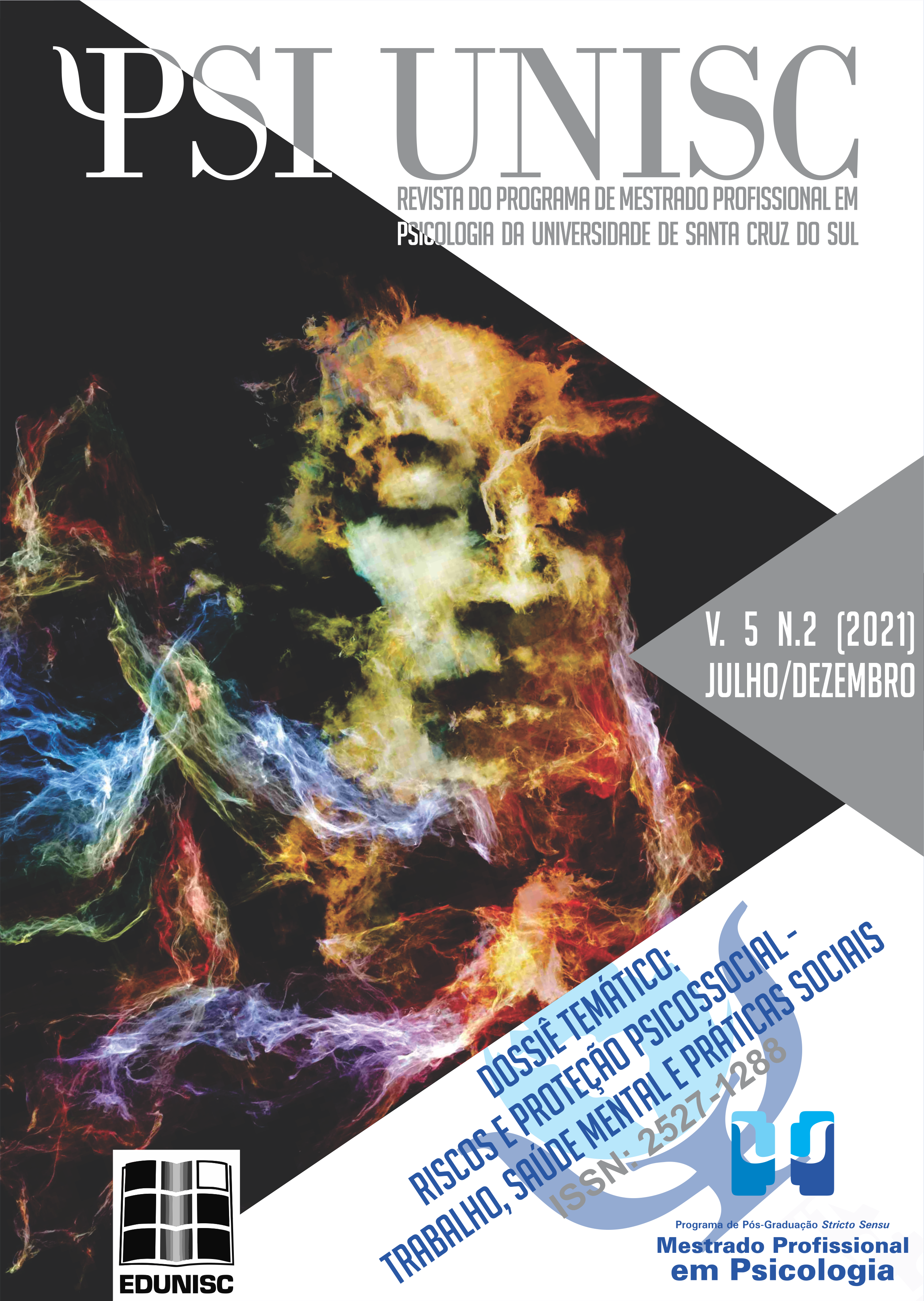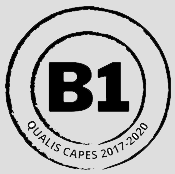From one health worker to many: sacrifice and sacralization in times of covid
DOI:
https://doi.org/10.17058/psiunisc.v5i2.16459Keywords:
Worker'shealth, Mental health, Pandemic, Remotework.Abstract
The experience report seeks to analyze, from the perspective of two mental health professionals from the Unified Health System (SUS), the sacrificial dimension of the health worker in the context of the COVID 19 pandemic, from June 2020 to March 2021 Initial reflections emerge about the work process in a Psychosocial Care Center (CAPS). The experience in this medium-complexity service reveals the anxieties produced by the decision-making power of the municipal health management, especially regarding the impossibility of remote work. In a second moment, reflections on specific issues reveal the national panorama of an extreme right-wing government that reiterates the sacrificial logic that emerges in the midst of the pandemic. Therefore, the concepts of power devices by Michel Foucault and Homo Sacer by Giorgio Agambem are used. Thus, the inseparability between the microsocial and macrosocial dimensions of the problems presented is perceived, and the term "frontline" is questioned in order to intersect the suffering of hospital service professionals with that of other health professionals in the SUS network, on medium complexity devices. It is concluded that the sacrificial dimension that the SUS health professional subjectively produces sustains a state of exception that, ultimately, by sacralizing the 'true heroes' also exposes them, both to the unnecessary risk of contagion and in the decisions to make a living and let it die.The experience report seeks to analyze, from the perspective of two mental health professionals from the Unified Health System (SUS), the sacrificial dimension of the health worker in the context of the COVID 19 pandemic, from June 2020 to March 2021 Initial reflections emerge about the work process in a Psychosocial Care Center (CAPS). The experience in this medium-complexity service reveals the anxieties produced by the decision-making power of the municipal health management, especially regarding the impossibility of remote work. In a second moment, reflections on specific issues reveal the national panorama of an extreme right-wing government that reiterates the sacrificial logic that emerges in the midst of the pandemic. Therefore, the concepts of power devices by Michel Foucault and Homo Sacer by Giorgio Agambem are used. Thus, the inseparability between the microsocial and macrosocial dimensions of the problems presented is perceived, and the term "frontline" is questioned in order to intersect the suffering of hospital service professionals with that of other health professionals in the SUS network, on medium complexity devices. It is concluded that the sacrificial dimension that the SUS health professional subjectively produces sustains a state of exception that, ultimately, by sacralizing the 'true heroes' also exposes them, both to the unnecessary risk of contagion and in the decisions to make a living and let it die.Downloads
References
Agamben, G. (2003). Homo sacer: o poder soberano e a vida nua. São Paulo, Iluminuras.
Agamben, G. (2004). Estado de exceção.:[Homo Sacer, II, I]. Boitempo Editorial.
Arán, M., & Peixoto Júnior, C. A. (2007). Vulnerabilidade e vida nua: bioética e biopolítica na atualidade. Revista de Saúde Pública, 41(5), 849–857. doi: 10.1590/s0034-89102006005000038
Bastos, M. A. P. C., da Silva, R. F., da Silva, E. A., Bastos, N. C. C., Cavalcanti, A. C. T., & Cavalcanti, E. C. T. (2020). O Estado de Exceção nas Favelas: perspectivas biopoliticas a partir da pandemia do covid-19. Revista Augustus, 25(51), 113–129. doi: 10.15202/1981896.2020v25n51p113
Cabral, H. L. T. B., & Zaganelli, M. V. (2016). Mistanásia: a morte miserável. São Paulo: Brasil Multicultural.
Campos, G. W. S. (2007). Um método para análise e co-gestão de coletivos: a constituição do sujeito, a produção de valor de uso e a democracia em instituições: o método da roda. São Paulo: Huncitec.
Conselho Federal de Psicologia [CFP]. (2013). Referências Técnicas para Atuação de Psicólogas(os) no CAPS - Centro de Atenção Psicossocial. Brasília: CFP. Recuperado de https://site.cfp.org.br/publicacao/referencias-tecnicas-para-atuacao-de-psicologasos-no-caps-centro-de-atencao-psicossocial/
Cruz, N. M. L. V., Souza, E. B. de, Sampaio, C. S. F., Santos, A. J. M. dos, Chaves, S. V., Hora, R. N. da, … Santos, J. E. dos. (2020). Apoio psicossocial em tempos de COVID-19: experiências de novas estratégias de gestão e ajuda mútua no sul da Bahia, Brasil. APS EM REVISTA, 2(2), 97–105. doi: 10.14295/aps.v2i2.94
Daltro, M. R, & Faria, A. A. (2019). Relato de experiência: Uma narrativa científica na pós-modernidade. Estudos e Pesquisas em Psicologia, 19(1), 223-237. Recuperado de http://pepsic.bvsalud.org/scielo.php?script=sci_arttext&pid=S1808-42812019000100013&lng=pt&tlng=pt.
Esperidião, E., Saidel, M. G. B., & Rodrigues, J. (2020). Saúde mental: foco nos profissionais de saúde. Revista Brasileira de Enfermagem, 73(suppl 1). doi: 10.1590/0034-7167.202073supl01
Ferreira, S., & Porto, D. (2019). Mistanásia × Qualidade de vida. Revista Bioética, 27(2), 191–195. doi: 10.1590/1983-80422019272000
Foucault, M. (1999). Microfísica do poder (14 ed.). Rio de Janeiro: Graal.
Foucault, M. (2004). Naissance de labiopolitique: CoursauCollège de France, 1978-1979. Paris, Gallimard/Seuil.
Foucault, M. (2007). Segurança, Território, População. São Paulo: Martins Fontes
Fortuna, C. M. (2020). Nem heróis, nem novo e nem normal: a pandemia e as práticas profissionais da enfermagem. Online Brazilian Journal of Nursing (Online), 19(2). Recuperado de https://pesquisa.bvsalud.org/portal/resource/pt/biblio-1152112
Han, C. Experience: Being Policed as a Condition of Life (Chile). In D. Fassin (Ed.), Writing the World of Policing The Difference Ethnography Makes (pp. 162-183). Chicago, EUA: University of Chicago Press
Horta, R. L., Camargo, E. G., Barbosa, M. L. L., Lantin, P. J. S., Sette, T. G., Lucini, T. C. G., … Lutzky, B. A. (2021). O estresse e a saúde mental de profissionais da linha de frente da COVID-19 em hospital geral. Jornal Brasileiro de Psiquiatria, 70(1), 30–38. doi: 10.1590/0047-2085000000316
Kadri, M. R. & Cunha, D. A. (2020). O Contexto da Pandemia e os Aspectos Éticos da Atuação da Psicologia. In Brasil (Org.), Guia de atenção psicossocial para o enfrentamento do COVID-19 no Amazonas (pp. 3-7). Brasília: Ministério da Saúde. Recuperado de http://www.saude.am.gov.br/docs/covid19/Arquivo_curso.pdf
Kavoor, A. R., Chakravarthy, K., & John, T. (2020). Remote consultations in the era of COVID-19 pandemic: Preliminary experience in a regional Australian public acute mental health care setting. Asian Journal of Psychiatry, 51, 102074. doi: 10.1016/j.ajp.2020.102074
Lobo, J. C. (2020). SANTOS, Boaventura de Sousa. A cruel pedagogia do vírus (Pandemia Capital). São Paulo: Boitempo, 2020. 35p. Campos - Revista de Antropologia, 21(1), 225-228. doi: 10.5380/cra.v21i1.73566
Looi, J. C., Allison, S., Bastiampillai, T., & Pring, W. (2020). Private practice metropolitan telepsychiatry in larger Australian states during the COVID-19 pandemic: an analysis of the first 2 months of new MBS telehealth item psychiatrist services. Australasian Psychiatry, 28(6), 644–648. doi: 10.1177/1039856220961906
Luiz, R. P. (2016). O estado de exceçao como paradigma de governo: a pessoa humana a partir de uma leitura em giorgio agambem. Colóquio de Ética, Filosofia Política E Direito, 0(0). Recuperado de https://online.unisc.br/acadnet/anais/index.php/efpd/article/view/15003/0
Macedo, R. S. (2016). A pesquisa e o acontecimento: compreender situações, experiências e saberes acontecimentais. Salvador: Edufba.
Moreira, W. C., Sousa, A. R. de, & Nóbrega, M. do P. S. de S. (2020). Mental Illness in the General Population and Health Professionals During Covid-19: A Scoping Review. Texto & Contexto - Enfermagem, 29, e20200215. doi: 10.1590/1980-265x-tce-2020-0215
Noal, D. S., Passos M. F. D., & de Freitas, C. M. (2020). Recomendações e orientações em saúde mental e atenção psicossocial na COVID-19. Rio de Janeiro: Fiocruz, 2020. Recuperado de https://www.fiocruzbrasilia.fiocruz.br/wp-content/uploads/2020/10/livro_saude_mental_covid19_Fiocruz.pdf
Prado, A. D., Peixoto, B. C., Da Silva, A. M. B., & Scalia, L. A. M. (2020). A saúde mental dos profissionais de saúde frente à pandemia do COVID-19: uma revisão integrativa. Revista Eletrônica Acervo Saúde, (46), e4128. doi: 10.25248/reas.e4128.2020
Pieper, F., Miguel, M., & Mendes, D. (2020). Necropolítica e sua lógica sacrificial em tempos de pandemia. Estudos Teológicos, 60(2), 533-553. doi: 10.22351/et.v60i2.4077
Resolução nº 11, 11 de maio de 2018. Regulamenta a prestação de serviços psicológicos realizados por meios de tecnologias da informação e da comunicação e revoga a Resolução CFP nº 11/2012. Recuperado de https://e-psi.cfp.org.br/resolucao-cfp-no-11-2018/
Resolução nº 4, de 26 de março de 2020. Dispõe sobre regulamentação de serviços psicológicos prestados por meio de Tecnologia da Informação e da Comunicação durante a pandemia do COVID-19. Recuperado de https://crpsp.org/legislacao/view/207
Rosa, S. O. (2007). Estado de exceção e vida nua: violencia policial em Porto Alegre entre os anos de 1960 e 1990 (Tese de Doutorado). Universidade Estadual de Campinas, Instituto de Filosofia e Ciencias Humanas, Campinas, SP, Brasil. Recuperado de http://www.repositorio.unicamp.br/handle/REPOSIP/280398
Santos, L. G. M., & Pedro, R. (2020). Máscara e homem negro: entre o contágio e o racismo em um regime necropolítico. Psicologia & Sociedade, 32, e020017. doi: 10.1590/1807-0310/2020v32240337
Santos, K. O. B., Fernandes, R. de C. P., Almeida, M. M. C. de, Miranda, S. S., Mise, Y. F., & Lima, M. A. G. (2020). Trabalho, saúde e vulnerabilidade na pandemia de COVID-19. Cadernos de Saúde Pública, 36(12), e00178320. doi: 10.1590/0102-311x00178320
Saramago, J. (1998). O Conto da Ilha Desconhecida. São Paulo: Companhia das Letras.
Schmidt, B., Crepaldi, M. A., Bolze, S. D. A., Neiva-Silva, L., & Demenech, L. M. (2020). Saúde mental e intervenções psicológicas diante da pandemia do novo coronavírus (COVID-19). Estudos de Psicologia (Campinas), 37, e20006. doi: 10.1590/1982-0275202037e200063
Seixas, C. M., & Birman, J. (2012). O peso do patológico: biopolítica e vida nua. História, Ciências, Saúde-Manguinhos, 19(1), 13–26. doi: 10.1590/s0104-59702012000100002
Siqueira, S. F., Ferreira, T. H. A., & Andrade D. C. M. (2020). Mistanásia ou eutanásia social: a morta infeliz no sus e a violação do princípio da dignidade da pessoa humana. Caderno de Graduação - Ciências Humanas E Sociais - UNIT - SERGIPE, 6(2), 99-112. Recuperado de https://periodicos.set.edu.br/cadernohumanas/article/view/8541
Trindade, D. D., & Fonseca, T. M. G. (2009). Que política é possível com o pensamento deleuziano?. Revista Mal Estar e Subjetividade, 9(1), 233-249. Recuperado de http://pepsic.bvsalud.org/scielo.php?script=sci_arttext&pid=S1518-61482009000100010&lng=pt&tlng=pt
Yellowlees, P., Nakagawa, K., Pakyurek, M., Hanson, A., Elder, J., & Kales, H. C. (2020). Rapid Conversion of an Outpatient Psychiatric Clinic to a 100% Virtual Telepsychiatry Clinic in Response to COVID-19. Psychiatric Service, 71, 749–752. Recuperado de https://ps.psychiatryonline.org/doi/10.1176/appi.ps.202000230
Zamora, J. C., Curia, B. G., Dupont, M. F., Marques, S. S., Luft, C. Z., Arnoud, T., ... Habigzang, L. F. (2020). Você não está sozinha! enfrentando a violência contra a mulher no isolamento pela COVID-19. Porto Alegre: PUCRS. Recuperado de http://www.pucrs.br/wp-content/uploads/2020/05/Voce-na-esta-sozinha-CartilhaMulheres.pdf
Zhan, Y., Liu, Y., Liu, H., Li, M., Shen, Y., Gui, L., … Yu, J. (2020). Factors associated with insomnia among Chinese front‐line nurses fighting against COVID‐19 in Wuhan: A cross‐sectional survey. Journal of Nursing Management, 28(7), 1525–1535. doi: 10.1111/jonm.13094
Downloads
Published
How to Cite
Issue
Section
License
The submission of originals to this journal implies the transfer, by the authors, of the printed and digital publication rights. The copyrights for the published articles are those of the author, with periodical rights on the first publication. Authors may only use the same results in other publications clearly indicating this journal as the medium of the original publication. Because we are an open access journal, we allow free use of articles in educational and scientific applications provided the source is cited under the Creative Commons CC-BY license.




